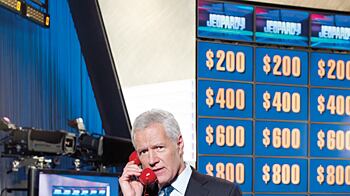Alex Trebek bounds across the blue-toned stage, past the giant board of clues, eager to take questions from the studio audience. It’s somewhere around the 6,000th episode of Jeopardy! he has hosted, and interacting with the crowd, he says, is his favorite part of the job. As he approaches the bleachers, he stops short. “Oh my!” he bellows when he sees about 30 fourth-graders in the top three rows. “We usually have mostly senior citizens, but today we have young people!”

Trebek, of all people, would know. For 27 years, the dapper emcee has hosted the dinnertime quiz show, whose nightly audience of 10 million is larger than the population of Arizona. At 70, Trebek is well inside Jeopardy!’s traditional demographic. (The median age of Jeopardy!’s viewership: What is 65, Alex?) But he has more stamina than any host who has ever hawked Turtle Wax. Gene Rayburn. Chuck Woolery. Bob Barker. He has outlasted them all.
Some 300 other game shows have come and gone since producer Merv Griffin revived Jeopardy! in 1984, but Trebek’s program has endured as the second most popular in all of syndication ( Wheel of Fortune, another Griffin brainchild, is first; Oprah hovers around fifth). Harry Friedman, Jeopardy!’s longtime producer, thinks it’s because of the program’s unflappably simple formula: a rigid format, paired with ever-changing content. Trebek says it’s “the best reality show on TV.”
If there’s such a thing as TV comfort food, Trebek is it. The host’s demeanor is so consistently predictable—save for that radical moment in 2001 when he shaved his bushy mustache—that he has been repeatedly called “the world’s greatest robot.” He has heard the critique so many times, he doesn’t even flinch anymore. “Well, I guess I’m the Energizer Bunny, folks. I just keep going.”
But as any devoted Jeopardy! fan can tell you, Trebek’s robot title is about to be challenged by a personable computer named Watson. This week, just in time for February sweeps, Jeopardy! will air a three-night match between Watson and the show’s two most successful players ever: Ken Jennings and Brad Rutter.
“I don’t want to do this forever,” he tells Newsweek, intimating that he may finally call it quits when his current contract expires in 2014.
Make no mistake: Watson is a formidable opponent. In the time it would take a human to respond to one trivia question, Watson—made up of more than 400 mainframes that fill an entire room at IBM’s labs in upstate New York—can scan the content of a million books. It’s also trained to understand the puns and twists of phrases unique to Jeopardy! clues. “If you beat the gajillion-whatever supercomputer, you’re a hero,” says Jennings, who in 2004 had the show’s longest winning streak, 74 games. “But if you lose, it is a computer, so I guess you did the best for your species.”
The unspoken irony here is that the match is something of a proxy war between Trebek—the analog host—and the digital future. Trebek freely admits that he’s “a pretty old computer, and slower because of it.” He tuned out the Internet Age somewhere in the late ’90s and holds an element of contempt for today’s quickened pace of communication. His cellphone, he says proudly, is the kind that still has an antenna, and he uses it, naturally, only to make phone calls. “I don’t text, I don’t access the Internet, I don’t blog, I don’t tweet,” he says, holding the last “t” for added disdain.
Despite the butleresque character he plays on TV, Trebek—whose parents actually named him George—can be a pretty goofy guy. One year, for the show’s holiday party, he took the entire 40-person crew indoor sky diving. Another time, he hired dance coaches to teach the staff to moonwalk on the set (he tried, then opted to sit aside and judge).
Born in Ontario, Trebek grew up wanting to be a doctor, or an actor, or prime minister of Canada. “I suppose I failed at all three,” he says. Instead, he ended up hosting a fledgling Canadian game show called Reach for the Top. He would go on to host eight other game shows before Jeopardy! came calling. After his first marriage dissolved in the early ’80s, Trebek spent the rest of the decade with his mother in an airy estate he owned on L.A.’s Mulholland Drive, before marrying his current wife, real-estate mogul Jean Currivan-Trebek. Mom, who turns 90 this year, still lives with her celebrity son, but in a guesthouse behind the sprawling 10,000-square-foot San Fernando Valley home he bought in 1992.
Trebek spends every weeknight in people’s living rooms, but he actually works only on Tuesdays and Wednesdays, when he tapes up to five shows in a row, pausing just minutes between each to change suits. The rest of the week he’s at home, mostly in his garden or on his couch. “I go through these cycles where I read a lot and then watch TV a lot,” he says. After Law & Order was canceled last year, he buried his nose in books about history and geography. Which leads to everyone’s obvious query: How well would he do as a Jeopardy! contestant? “Against my peers, pretty well, but a good 30-year-old would clean my clock.”
Finding 30-year-olds who even watch Jeopardy! was a challenge just a decade ago. So in 2001, producers brought in a new feature called the Clue Crew, a youthful threesome tasked with jetting around the world and reading clues that appear under new, worldlier categories. “I think they brought us in to give the show a new look,” says Sarah Whitcomb, one of the crew’s photogenic thirtysomethings. The show’s set underwent a few face-lifts (loyalists screamed when a set designer changed the iconic blue color scheme to a different shade of blue). More video and audio clues were added, as were tournaments for college students and teens. This year the show will host its first tournament of teachers. The changes worked, and Jeopardy! says its median demographic has declined from 70 years old in 2000 to the current 65, one of its lowest points ever.
That’s still decades away from the coveted 18-34 sweet spot that advertisers love, but enough to keep the show from extinction, as a new generation of Internet-savvy viewers huddle in their dorm rooms to test their polymathic abilities. About 400,000 people visit Jeopardy!’s website each month, and the show has 316,000 Facebook fans. When told there’s a website, j-archive.com, that monitors every clue, contestant, and dollar amount in the show’s history, Trebek says that Jeopardy!’s obsessives should “get a life.”
The host himself seems to yearn for a life beyond Jeopardy! “I don’t want to do this forever,” he tells Newsweek, intimating that he may finally call it quits when his current contract expires in 2014. It bears noting that Trebek has repeatedly threatened to retire over the years, but he always reneges before his producers really start to worry (that may have something to do with his salary, which is rumored to be in the double-digit millions). “There are other things I’d like to do,” he says. Traveling more would be nice. Three times during a series of interviews, he mentions how much he enjoys fixing sprinklers.
Could Trebek’s plans have something to do with that whippersnapper Watson? “Who knows, five years from now, Watson might be the size of—” Trebek grabs what looks like a book from the counter next to where he’s getting his face put on. “What is this?” he asks his makeup artist. She tells him. “Oh, yes, Watson will be like an iPad!”
Then he gets pensive. “You know, if IBM has developed a computer system that plays Jeopardy!—and I told them this—I said I’ll be impressed when you develop a robot that can host Jeopardy!”
While one of his assistants laughs off the thought, the host just shrugs. “But I guess that’s not too far off.”





